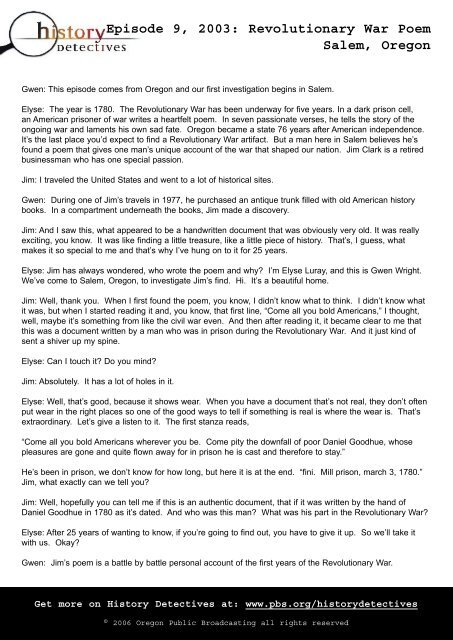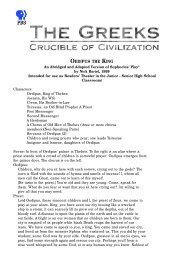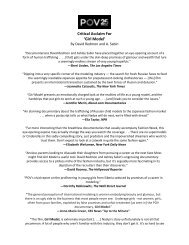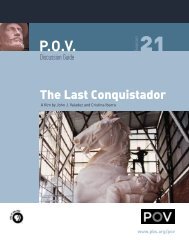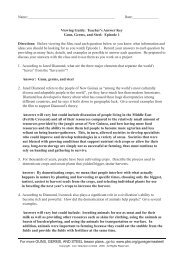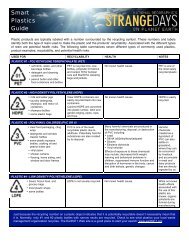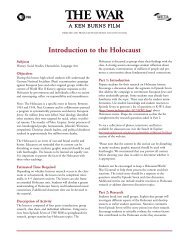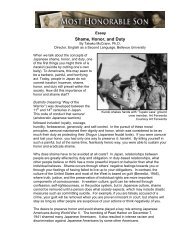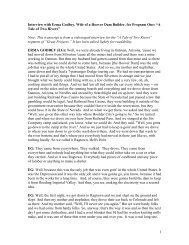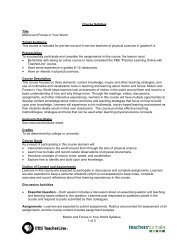Episode 9, 2003: Revolutionary War Poem Salem, Oregon - PBS
Episode 9, 2003: Revolutionary War Poem Salem, Oregon - PBS
Episode 9, 2003: Revolutionary War Poem Salem, Oregon - PBS
You also want an ePaper? Increase the reach of your titles
YUMPU automatically turns print PDFs into web optimized ePapers that Google loves.
<strong>Episode</strong> 9, <strong>2003</strong>: <strong>Revolutionary</strong> <strong>War</strong> <strong>Poem</strong><strong>Salem</strong>, <strong>Oregon</strong>Gwen: This episode comes from <strong>Oregon</strong> and our first investigation begins in <strong>Salem</strong>.Elyse: The year is 1780. The <strong>Revolutionary</strong> <strong>War</strong> has been underway for five years. In a dark prison cell,an American prisoner of war writes a heartfelt poem. In seven passionate verses, he tells the story of theongoing war and laments his own sad fate. <strong>Oregon</strong> became a state 76 years after American independence.It’s the last place you’d expect to find a <strong>Revolutionary</strong> <strong>War</strong> artifact. But a man here in <strong>Salem</strong> believes he’sfound a poem that gives one man’s unique account of the war that shaped our nation. Jim Clark is a retiredbusinessman who has one special passion.Jim: I traveled the United States and went to a lot of historical sites.Gwen: During one of Jim’s travels in 1977, he purchased an antique trunk filled with old American historybooks. In a compartment underneath the books, Jim made a discovery.Jim: And I saw this, what appeared to be a handwritten document that was obviously very old. It was reallyexciting, you know. It was like finding a little treasure, like a little piece of history. That’s, I guess, whatmakes it so special to me and that’s why I’ve hung on to it for 25 years.Elyse: Jim has always wondered, who wrote the poem and why? I’m Elyse Luray, and this is Gwen Wright.We’ve come to <strong>Salem</strong>, <strong>Oregon</strong>, to investigate Jim’s find. Hi. It’s a beautiful home.Jim: Well, thank you. When I first found the poem, you know, I didn’t know what to think. I didn’t know whatit was, but when I started reading it and, you know, that first line, “Come all you bold Americans,” I thought,well, maybe it’s something from like the civil war even. And then after reading it, it became clear to me thatthis was a document written by a man who was in prison during the <strong>Revolutionary</strong> <strong>War</strong>. And it just kind ofsent a shiver up my spine.Elyse: Can I touch it? Do you mind?Jim: Absolutely. It has a lot of holes in it.Elyse: Well, that’s good, because it shows wear. When you have a document that’s not real, they don’t oftenput wear in the right places so one of the good ways to tell if something is real is where the wear is. That’sextraordinary. Let’s give a listen to it. The first stanza reads,“Come all you bold Americans wherever you be. Come pity the downfall of poor Daniel Goodhue, whosepleasures are gone and quite flown away for in prison he is cast and therefore to stay.”He’s been in prison, we don’t know for how long, but here it is at the end. “fini. Mill prison, march 3, 1780.”Jim, what exactly can we tell you?Jim: Well, hopefully you can tell me if this is an authentic document, that if it was written by the hand ofDaniel Goodhue in 1780 as it’s dated. And who was this man? What was his part in the <strong>Revolutionary</strong> <strong>War</strong>?Elyse: After 25 years of wanting to know, if you’re going to find out, you have to give it up. So we’ll take itwith us. Okay?Gwen: Jim’s poem is a battle by battle personal account of the first years of the <strong>Revolutionary</strong> <strong>War</strong>.Get more on History Detectives at: www.pbs.org/historydetectives© 2006 <strong>Oregon</strong> Public Broadcasting all rights reserved
<strong>Episode</strong> 9, <strong>2003</strong>: <strong>Revolutionary</strong> <strong>War</strong> <strong>Poem</strong><strong>Salem</strong>, <strong>Oregon</strong>“For those ruffians of Britain’s by thousands did come to slay the boys of Boston in the western land. Nowthe people of America did assemble and agree to drive them from the land that is called liberty.”The poem makes other references to New England, so we’ve decided to begin our investigation in Boston,Massachusetts.Elyse: As Gwen sets off to investigate Goodhue, the man, I’m taking the poem to Stewart Whitehurst at therare manuscripts department of Skinner auction house. I’m hoping he can help me authenticate the poem as18th century. It’s dated 1780, you know, and it feels old to me. It looks period to me, but I need your expertopinion. It’s a great first step. Does it feel old? Does it -- does it give you that little tingle?Stewart: Let’s get the light box on. Now, have you looked to see if there’s a watermark -- no. You havenot. Well, a watermark actually is an indication of who may have made the paper, which can provide veryimportant clues, as to date, authenticity, that sort of thing. Let’s look here. Will be something asymmetrical,something different. There it is. See that little shaped half circle there?Elyse: Absolutely.Stewart: It’s actually a partial watermark.Elyse: Little half circle. I never would have noticed that.Stewart: See if we can identify what it might be. And it is indistinguishable. So I don’t know if we’re going tobe able to get much information off of it.Elyse: Without a watermark, Stewart isn’t able to date the paper precisely, but there are other methods. It’sdated 1780. Now what you would expect to find on a piece of paper that’s made in 1780 is that it’s made ofwhat we call laid paper.Stewart: Okay, now, we’re looking for those strong lines that are going vertically. Those are some main chainlines. And then all the smaller cross lines that are going across, that is your absolutely typical pattern thatyou would expect to find on laid paper.Elyse: Now, talk to me about the style of the handwriting.Stewart: There are a couple of affectations that you find, at least in 18th-century writing, that kind of go bythe wayside in the 19th century. What appears to be an “f” to our eyes now which is actually an “s,” so itlooks like, let’s see if we can find any one in here. Ah, perfect. Here we go. If you look right here, it says,“Those ruffians.” Look at that. See, there it is. Instead of an “s,” it actually looks more like an “f.” okay, that’s-- absolutely. That would be considered a pretty strong 18th century -- that’s incredible. All in all, you put thepackage together, certainly looks like it could be from 1780.Elyse: That’s just what I wanted to hear. Excellent.Gwen: I’m starting my investigation into our poet at the Massachusetts historical society. I’m hoping theirarchives hold some evidence about Daniel Goodhue’s life. This is volume 6, names f and g, of “Sailorsand Soldiers of the <strong>Revolutionary</strong> <strong>War</strong> from the Colony of Massachusetts.” If Daniel Goodhue was fromMassachusetts and he served in the <strong>Revolutionary</strong> <strong>War</strong>, his name will be in here.Get more on History Detectives at: www.pbs.org/historydetectives© 2006 <strong>Oregon</strong> Public Broadcasting all rights reserved
<strong>Episode</strong> 9, <strong>2003</strong>: <strong>Revolutionary</strong> <strong>War</strong> <strong>Poem</strong><strong>Salem</strong>, <strong>Oregon</strong>Ah, here’s the page for Goodhues. Immediately, I notice that there are multiple spellings of the nameGoodhue and three Goodhues with the first name Daniel. Obviously, it was a fairly common name andthere’s nothing here that suggests that any of these men were captured and put in a prison. So I don’t knowif Daniel Goodhue, our poet, is one of these people. I need a different strategy. I’m running out of sources.There may be a reference to Mill Prison in this book, “Mariners of the American Revolution.” Here’s a noteon the prisons where the American rebels were brought. “Mill Prison at Plymouth, England.” So the sailors,the American sailors who were captured were taken to England and imprisoned there. So that’s one mysterysolved. The Mill Prison that our poet speaks of really did exist, but it was about 3,000 miles away acrossthe Atlantic. Now, let me see if Daniel Goodhue is listed here as a sailor who was captured. Here he is.Daniel Goodhue of Ipswich, captured aboard the “Fancy,” August 7, 1777. This must be our man. I think wehave some important facts in place now. We know that Daniel Goodhue existed. He came from Ipswich,Massachusetts. He was captured aboard the “Fancy” and taken to Mill Prison in Plymouth, England. IfGoodhue was captured aboard a ship, then he must have been a sailor. I need to find out more about hisservice aboard the “Fancy.” I’ve come to the navy history center in Washington, D.C., to consult with thedirector of the early history branch. I know that Daniel Goodhue was a sailor, so I’m hoping that Dr. MichaelCrawford can tell me more about Goodhue’s role in the war and how he landed in Mill Prison. He wascaptured aboard a ship called the “Fancy.” do you know something of the history of that ship? Was it one ofthese early navy ships?Michael: The “Fancy” was not a continental navy ship. They all had names like “Tyrannicide” or “Defense” or“Revenge” or something like that. “Fancy” is not a warship’s name. It’s likely it was a privateer. At the startof the war in 1775, general George Washington knew that, in order to defeat the British, he had to assemblea navy out of nothing. So the general commissioned privateers, mainly merchant ships for hire, to attackand seize incoming British supplies and trade. And here Dr. Crawford discovers a record of the British shipscaptured by Goodhue’s privateer.Michael: The “Brunswick,” the “Cleveland,” the “Kanoul,” the “Dillon,” and an unidentified sloop.Gwen: So with five British ships that she captured, Daniel Goodhue’s ship, the “Fancy,” made a realcontribution to the war effort?Michael: She really was a successful cruise until she got caught. “Was captured between silly and ushent.”On August 6, 1777, Goodhue’s ship was 20 miles off the coast of England, preying on British merchantvessels. Two hours before dawn they were spotted by a heavily armed British warship. Vastly overpowered,they had no choice but to flee. A 28-hour chase ensued. The “Fancy” made several desperate attemptsto get away, including dumping 9 of its 12 cannons overboard to gain speed. At 8:30 the next morning,they were fired upon. The entire crew abandoned ship and made for the shoreline. But they were soonoverwhelmed by British marines. 56 men, including Daniel Goodhue, were captured and taken to Mill Prison,where they joined about 1200 other prisoners of war.Gwen: Can you give me an overall sense of what conditions were like in Mill Prison?Michael: It was a hard life. The food was bad. They usually were given bad meat and moldy cheese. Poorfood led to bad nutrition, which, given the crowded conditions, also led to disease. So given the disease andthe malnutrition and the general conditions, many of the men must have died in prison.Gwen: Is that right?Get more on History Detectives at: www.pbs.org/historydetectives© 2006 <strong>Oregon</strong> Public Broadcasting all rights reserved
<strong>Episode</strong> 9, <strong>2003</strong>: <strong>Revolutionary</strong> <strong>War</strong> <strong>Poem</strong><strong>Salem</strong>, <strong>Oregon</strong>Michael: Death came frequently.Gwen: So we still don’t know if Goodhue survived prison. But we do know that he’s from Ipswich,Massachusetts. With Elyse still in New England, we decide the next step is to visit the Ipswich historicalsociety to see if Daniel Goodhue ever returned home.Elyse: I pull every town record that I can carry and start my search. Okay, the first book is Ipswich VitalRecords. Let’s see what I can find in here. Here’s a list of Ipswich’s birth announcements. Ah! “Daniel,December 16, 1759.” that means he was 20 years old when he wrote the poem. Next, I’d like to find outwhen Daniel enlisted. This chapter is called the <strong>Revolutionary</strong> <strong>War</strong>, and on the first page, it lists all thepeople that enlisted on January 24, 1775. And in the top 10 is Daniel. Wow! That means he was 15 yearsold when he enlisted. That’s so young! But that doesn’t tell me if Daniel ever returned home from Mill Prison.Is there anything here about life in Ipswich after the war? Ha! Listen to this! “In may, 1787, the ‘Hannah,’fitted for a fishing ship, and captain Newman’s crew included Daniel Goodhue.” That’s seven years after hewrote the poem. But he survived. I now have proof that he definitely survived and he came home. Withan image of Daniel Goodhue finally beginning to surface, I’m curious to know what his life was like whenhe returned to Ipswich. Let’s see if our friend Daniel got married. Ah! Here it is! “Daniel and Hannah,November 30, 1788.” Eight years after he wrote the poem, he got married. And Daniel lived the rest of hislife in Ipswich, becoming the captain of his own ship and fathering four children. November 16, 1803, CaptainDaniel died. That’s 23 years after he wrote the poem.Gwen: Anxious to tell Jim the news, Elyse and I returned to <strong>Oregon</strong>. The first thing you asked us to find outwas if the document was real. And I can tell you it’s definitely 100% authentic 18th century.Jim: Wonderful. That’s exciting. That in itself is exciting. That’s great.Gwen: We also discovered a great deal about Daniel Goodhue. Not only did he exist, and there were anumber of people with the name, but the one who was your poet joined the crew of a privateer called the“Fancy” and went to sea to bring down British trading ships. They captured four major British ships, sentthem back to Boston, and then perhaps got a bit too sure of their luck and skill, because they were finallycaptured in 1777, off the shores of England.Jim: Wow! That’s amazing!Gwen: And three years later, he wrote this poem. So he was still a teenager when in prison and wrote thispoem. Incredible. We know for a fact that he did survive Mill Prison. About half the prisoners survived, soit’s pretty amazing that he survived. And what he did was, he went home. He went home to his hometown.He went back to the sea for work and then two years later he got married, and he spent the rest of his life inhis hometown. Now that you have so much knowledge, here’s your poem again.Jim: Great! You can have it back after 25 years.Gwen: Well, we have something else we want to give you. It’s called, “A Relic of the Revolution.” and it’san account of conditions in Mill Prison during the years that Daniel Goodhue was there. And what’s I thinkespecially exciting about this, is here we have the crew of the brigantine “Fancy” who were in the prison withhim. And they include, here toward the bottom, Daniel Goodhue.Get more on History Detectives at: www.pbs.org/historydetectives© 2006 <strong>Oregon</strong> Public Broadcasting all rights reserved
<strong>Episode</strong> 9, <strong>2003</strong>: <strong>Revolutionary</strong> <strong>War</strong> <strong>Poem</strong><strong>Salem</strong>, <strong>Oregon</strong>Jim: I’ll be darned! Isn’t that wonderful? That’s too cool! That’s great!Gwen: We noticed you were a collector of books.Jim: Oh, yeah, I love old books.Gwen: Well, this will go on your shelf now.Jim: It sure will. Thank you very much. It’s even got a ship on it. You know, if it wasn’t so corny, I’d say,“God bless America.” [ laughter ]Gwen: You just said it.Jim: I did.ENDSGet more on History Detectives at: www.pbs.org/historydetectives© 2006 <strong>Oregon</strong> Public Broadcasting all rights reserved


